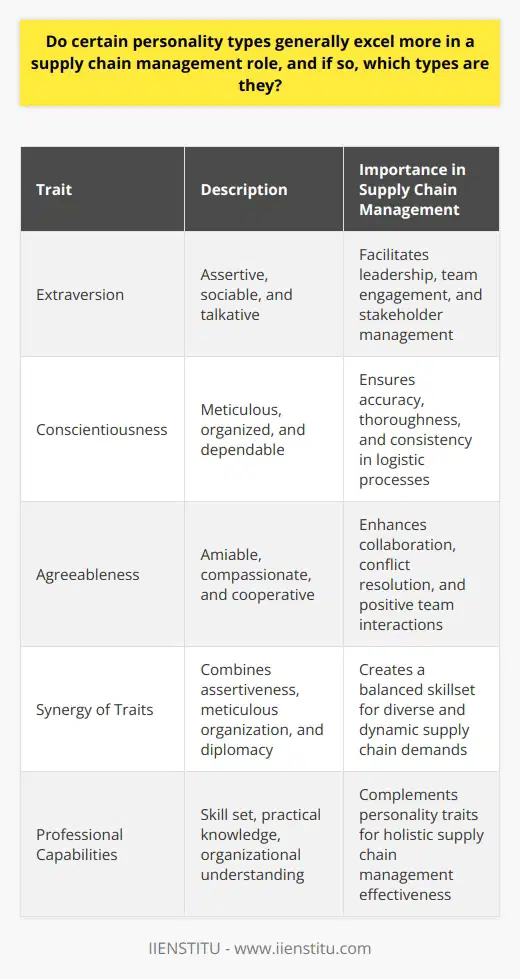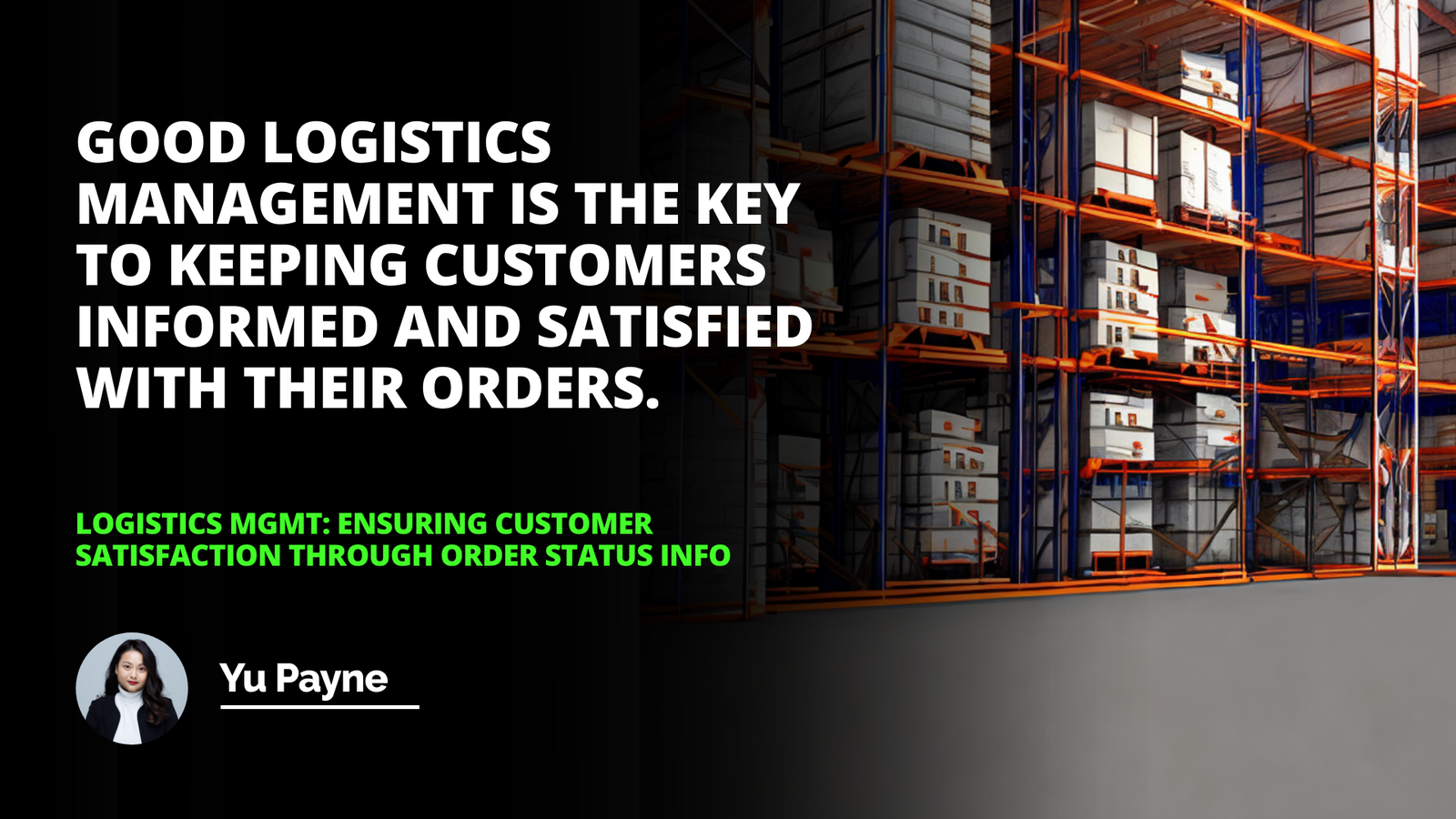
I still remember the day I first stepped into the bustling world of supply chain management. The warehouse buzzed with activity—forklifts beeping, conveyors humming, and teams coordinating in a symphony of logistics. It was overwhelming, to say the least. But what struck me most wasn't the machinery or the sheer scale of operations; it was the people. Each individual brought a unique spark to the team, and I began to wonder: How do all these different personalities come together to keep the supply chain moving smoothly?
I. Introduction
II. Personality Tests in the Supply Chain
III. Understanding the Group Culture of Supply Chain Teams
IV. Tips for Managing the Supply Chain
V. Conclusion
Embracing Personalities in the Supply Chain
In the complex realm of supply chain management, it's often the people behind the processes who make the real difference. Over time, I've come to appreciate how personality tests and natural aptitude assessments can be invaluable tools. They don't just fill a HR checkbox; they unlock insights into how team members can best collaborate.
Take the Myers-Briggs Type Indicator (MBTI), for instance. It categorizes individuals into 16 personality types based on preferences like introversion vs. extroversion and thinking vs. feeling. In a supply chain team, knowing that Alex is an ENFP (Extroverted, Intuitive, Feeling, Perceiving) while Sam is an ISTJ (Introverted, Sensing, Thinking, Judging) can help in assigning roles that play to their strengths.
Real-world Impact of Personality Assessments
I recall a project where we were tasked with optimizing our distribution routes. We had a tight deadline, and tensions were high. By leveraging personality assessments, we realized that pairing an analytical thinker with a creative problem-solver could yield innovative yet practical solutions. And it did! The synergy was undeniable, and we met our deadline with a plan that reduced delivery times by 15%.
But it's not just about tasks. Understanding personalities helps in:
Firstly, managers should ensure that team members understand their roles and responsibilities. This ensures that everyone knows their part in making the team successful.
Secondly, managers should create an environment of open communication where ideas and feedback can be shared freely. This will help to foster creativity and effective problem-solving.
Finally, supply chain teams should have open lines of communication with partners and suppliers. This can help to improve the overall efficiency of the process.
Enhancing communication: Knowing if someone prefers direct instructions or needs a bit more context.
Conflict resolution: Anticipating potential clashes and addressing them proactively.
Building trust: Appreciating each other's work styles fosters mutual respect.
Unpacking the Group Culture of Supply Chain Teams
Group culture is like the invisible thread that binds a team together. It's built on shared values, beliefs, and norms. In supply chain teams, where collaboration is key, cultivating a positive group culture is essential.
Managing a supply chain is like a personality test. The responses of each piece dictate the culture of the whole.
The Heartbeat of Team Dynamics
Imagine a scenario where every team member operates in a silo, unaware of others' contributions or challenges. The result? Misaligned goals, duplicated efforts, and a breakdown in the supply chain. Conversely, when a team shares a common culture:
Communication flows effortlessly.
Roles and responsibilities are clear.
There's a collective commitment to the team's objectives.
I once worked with a team that embraced the mantra "We're only as strong as our weakest link." This ethos encouraged everyone to support each other, ensuring no one was left behind. It wasn't about competition but collaboration, and it showed in our performance metrics.
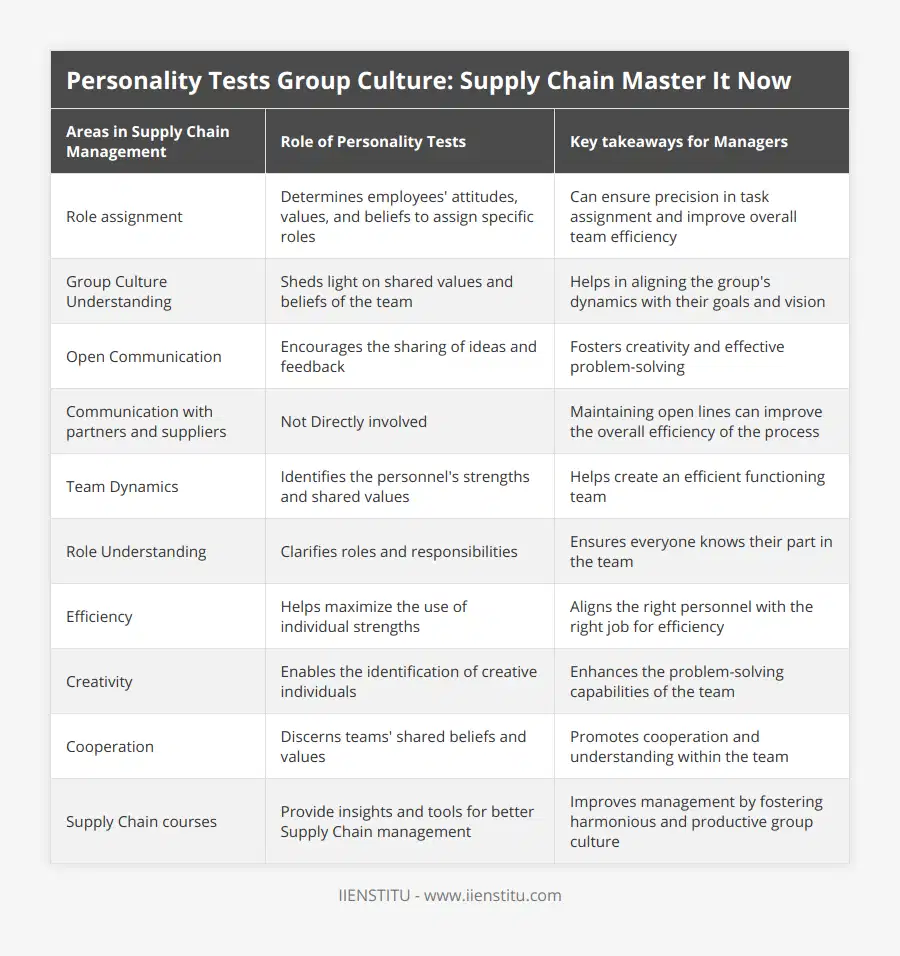
Cultivating a Cohesive Culture
Building such a culture doesn't happen overnight. Here are some steps that can help:
1- Define clear values: What does your team stand for? Efficiency? Innovation? Reliability?
2- Promote open dialogue: Encourage team members to share ideas and feedback.
3- Recognize achievements: Celebrate both individual and team successes.
4- Provide growth opportunities: Invest in training and development.
5- Foster inclusivity: Ensure everyone feels valued and heard.
By focusing on these areas, managers can create an environment where team members are motivated to contribute their best.
Tips for Effective Supply Chain Management
Managing a supply chain is no small feat. It requires a blend of strategic planning, people management, and a keen eye for detail. Here are some practical tips I've gathered over the years:
1. Know Your Team Inside Out
Understanding your team’s strengths and weaknesses is crucial. Use personality assessments to:
Assign roles that match natural aptitudes.
Identify potential areas for development.
Create balanced teams with complementary skills.
For example, if you're assembling a team for a new project, consider who thrives under pressure and who excels in detailed analyses.
2. Foster Open Communication
An open line of communication is the lifeline of any supply chain team.
Hold regular meetings to keep everyone updated.
Encourage the use of collaborative tools like Slack or Trello.
Create a safe space for sharing concerns and suggestions.
Remember, miscommunication can lead to costly errors in the supply chain.
3. Build Relationships with Partners and Suppliers
Your team extends beyond your immediate colleagues.
Develop strong partnerships with suppliers.
Negotiate mutually beneficial terms.
Keep them informed about changes that might affect them.
This not only improves efficiency but also builds trust and reliability in the network.
4. Embrace Technology
Stay ahead by leveraging the latest tech solutions.
Implement supply chain management software for real-time tracking.
Use data analytics to forecast demand and manage inventory.
Train your team on new technologies to maximize their benefits.
5. Plan for Contingencies
The supply chain is susceptible to unexpected disruptions.
Develop contingency plans for potential risks like natural disasters or supplier failures.
Conduct regular risk assessments.
Ensure that everyone knows the protocols during emergencies.
Being prepared can mitigate losses and maintain operations during crises.
6. Continuous Improvement is Key
Never settle for "good enough."
Regularly review processes for inefficiencies.
Solicit feedback from team members on improvements.
Stay updated on industry trends and best practices.
Adopting a mindset of continuous improvement keeps your supply chain competitive.
The Intersection of Personal Growth and Supply Chain Management
Interestingly, the principles that guide effective supply chain management often overlap with personal development strategies. Just as we use personality assessments to optimize team performance, individuals can use similar tools for self-improvement.
I once had a team member who felt unfulfilled in his role. After some introspection and assessment, he realized his strengths were better suited for procurement rather than logistics. We supported his transition, and he flourished in his new position. This not only boosted his morale but also enhanced our team's overall performance.
This brings me to an important point: sometimes, team members may seek role changes or reassignment within the organization. Providing reassignment request letter tips and information can facilitate smooth transitions. Supporting team members in finding their best fit not only benefits them personally but also strengthens the team.
Conclusion
Managing a supply chain is like conducting an orchestra. Each instrument (or team member) has a unique sound, but when played in harmony, they create a beautiful symphony. By understanding and leveraging individual personalities, fostering a strong group culture, and implementing effective management strategies, we can create supply chain teams that are both efficient and resilient.
So next time you're in the thick of coordinating logistics, take a moment to appreciate the people beside you. Investing in understanding them not only builds a stronger team but also paves the way for success in the dynamic world of supply chain management.
References
Covey, S. R. (1989). The 7 Habits of Highly Effective People. Free Press.
Goleman, D. (1995). Emotional Intelligence. Bantam Books.
Christopher, M. (2016). Logistics & Supply Chain Management (5th ed.). Pearson Education.
Lencioni, P. (2002). The Five Dysfunctions of a Team: A Leadership Fable. Jossey-Bass.
Chopra, S., & Meindl, P. (2019). Supply Chain Management: Strategy, Planning, and Operation (7th ed.). Pearson.
Note: The experiences and examples shared are based on common scenarios in supply chain management and are intended to illustrate the concepts discussed.
Frequently Asked Questions
What personality traits are commonly seen in successful supply chain managers?
Supply chain management is considered one of the most in-demand roles in modern business, and many companies are now looking for supply chain managers to help manage their operations. Successful supply chain managers have traits beyond the specific skills associated with the role. The key to success in this area is building relationships, using data-driven decisions, and possessing certain personal qualities.
Data-driven decisions are essential for supply chain optimization. Good supply chain managers can interpret data and use it to devise a strategy that optimizes efficiency and customer service. In making decisions, successful managers must be able to evaluate various information sources and choose the best course of action for the company. They must also stay on top of technological advancements that could make processes more accessible and efficient.
Building relationships is a crucial aspect of supply chain management, as the role requires collaborating with customers, suppliers, and partners. Successful supply chain managers must quickly build trusting relationships, which will be essential for smooth operations. Good communication and negotiation skills are also necessary for these relationships.
Personal qualities also play a part in the success of supply chain managers. Attention to detail and organizational skills are critical in this role, as is the ability to handle multiple tasks simultaneously. Leadership qualities are also important, as it is up to the manager to form a cohesive team and motivate them to achieve performance goals. Additionally, strong problem-solving skills are necessary to anticipate and resolve any issues.
In summary, successful supply chain managers possess certain traits essential to the overall operation's success. To be successful, they must be able to make data-driven decisions, build relationships, handle multiple tasks at once, use leadership skills, and demonstrate problem-solving skills. With these traits, supply chain managers can ensure the operation runs smoothly and efficiently, leading to successful outcomes for the company.

How can organizations use personality assessment to cultivate a strong group culture?
Organizations that leverage personality assessment to cultivate a strong group culture enable employees to share the same understanding of job expectations and the organizational values necessary to work together. Such reviews provide insight into employees’ traits and a way to connect at a fundamental level. This understanding can be applied directly to cultivate a positive and productive group culture.
One of the powerful aspects of personality assessment is that employee perceptions often become self-fulfilling prophecies and influence workplace dynamics. This can be accomplished by assessing individual traits, attitudes, and aptitudes and then providing feedback that resonates with employees and helps them understand their strengths, weaknesses, and roles in the workplace. In addition, this feedback can further cultivate a group culture among employees based on synergy and open communication.
Another effective way to use personality assessments is to increase understanding of different generations and cultural backgrounds to ensure that all global employees are engaged and motivated. With mutual agreement, cultural differences can be used to develop a more cohesive and innovative culture among employees. In addition, it facilitates conversations about organizational goals and directions and helps bridge generational gaps within the organization.
Personality assessments can also be used to evaluate job performance regularly by providing clear feedback, creating opportunities for employees to work together towards common goals, and fostering better communication, collaboration, and understanding. This feedback gives employees direction and drives a sense of purpose within the organization.
In conclusion, organizational success is contingent upon a strong group culture that values and embraces diversity and inclusion, understanding and respect among team members, and developing meaningful relationships. Personality assessment is a powerful tool that organizations can use to create a culture of trust and mutual respect rooted in an understanding of individual traits and attitudes. Doing so will ensure successful recruitment, retention, and promotion of employees, ultimately leading to increased employee engagement and satisfaction.
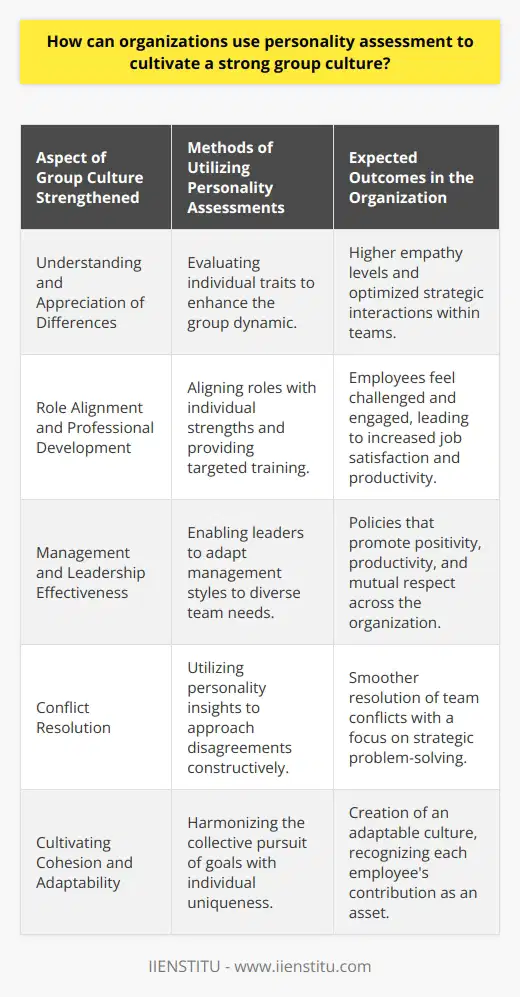
What techniques can be employed to effectively manage a supply chain in a dynamic business environment?
Supply chain management has become increasingly complex for organizations in a dynamic business environment. This is especially true for those operating in fast-paced IT and consumer goods industries. Thus, practical techniques for managing the supply chain are critical for businesses to stay competitive and to ensure their short and long-term success.
One technique that can be employed to manage a supply chain in a dynamic business environment effectively is collaborative planning, forecasting, and replenishment (CPFR). This practice links personnel from both the customer and supplier sides to create a shared understanding of the supply chain and to plan for any potential disruptions or delays. CPFR can help all parties to understand customer needs better and anticipate future demand to minimize costs and maximize efficiency.
Another effective technique is to consider the entire supply chain when making decisions. When decisions are made without considering the whole supply chain, the result can be supply chain disruptions and unhappy customers. Furthermore, it is essential to recognize that even slight changes to the supply chain, such as a supplier closing a branch, can have far-reaching effects. Thus, it is necessary to understand how each step in the supply chain interacts and to think about potential changes that could happen within the chain.
By leveraging technology and big data, organizations can also improve their supply chain management in a dynamic business environment. For example, big data can be used to accurately forecast trends and customer needs, enabling an organization to adjust operations more quickly. Additionally, modern supply chain solutions such as enterprise resource planning systems allow organizations to obtain real-time visibility into their supply chain, enabling them to make more informed decisions about inventory planning and cost optimization.
Overall, managing a supply chain in a dynamic business environment is a complex process that requires multiple techniques. By leveraging CPFR, considering the entire supply chain when making decisions, and using technology and big data, organizations can ensure that their supply chain operations are optimized and remain competitive in this ever-changing landscape.
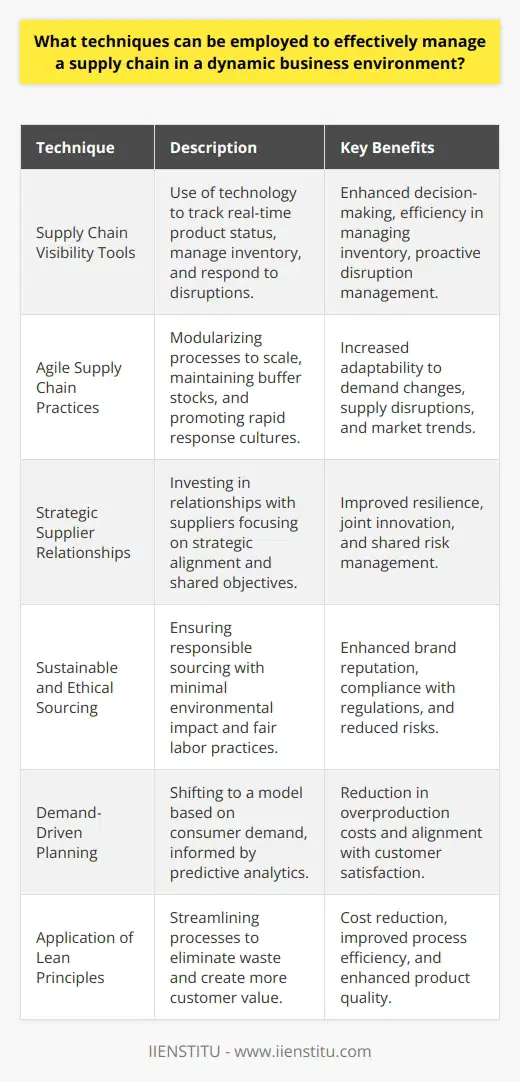
What key attributes and qualities contribute to the ideal personality of a supply chain manager?
Key Attributes and Qualities of a Supply Chain Manager
Strong Leadership Skills
A supply chain manager must possess strong leadership skills to effectively manage a diverse team and collaborate with various departments. They must be able to provide direction, delegate responsibilities, and motivate team members to perform their best while adapting to changes in the supply chain process.
Analytical Thinking
Analytical thinking is crucial for a supply chain manager, as they must constantly analyze trends, data, and performance metrics to make informed decisions that optimize supply chain operations. They should have a keen eye for identifying inefficiencies, detecting issues, and finding solutions that reduce costs and improve overall productivity.
Effective Communication and Interpersonal Skills
Effective communication and interpersonal skills are essential for a supply chain manager, who often serves as a bridge between vendors, suppliers, customers, and internal departments. They must be able to communicate clearly and concisely while fostering a collaborative work environment to ensure everyone is working towards common goals.
Ability to Multitask
The ability to handle multiple tasks concurrently is key for a successful supply chain manager. They must be prepared to deal with sudden changes, such as unexpected delays, inventory shortages, or logistical issues, and adjust plans and strategies accordingly to minimize disruptions to the supply chain operations.
Knowledge of Industry and Technology
A thorough understanding of industry trends, best practices, and technological advancements is critical for a supply chain manager. They must stay up-to-date with the latest innovations and developments in the field to identify opportunities and leverage technology to streamline processes and boost efficiency.
Risk Management
Effective risk management is a crucial component of supply chain management. Supply chain managers must be adept at identifying potential risks and vulnerabilities in the supply chain network, devising contingency plans and mitigation strategies to minimize the impact of disruptions.
Ethical Considerations
Lastly, an ideal supply chain manager must be ethical and ensure the organization adheres to relevant laws, regulations, and ethical guidelines. They should champion the importance of corporate social responsibility, environmental sustainability, and fair labor practices, fostering a culture of responsible and ethical supply chain management.
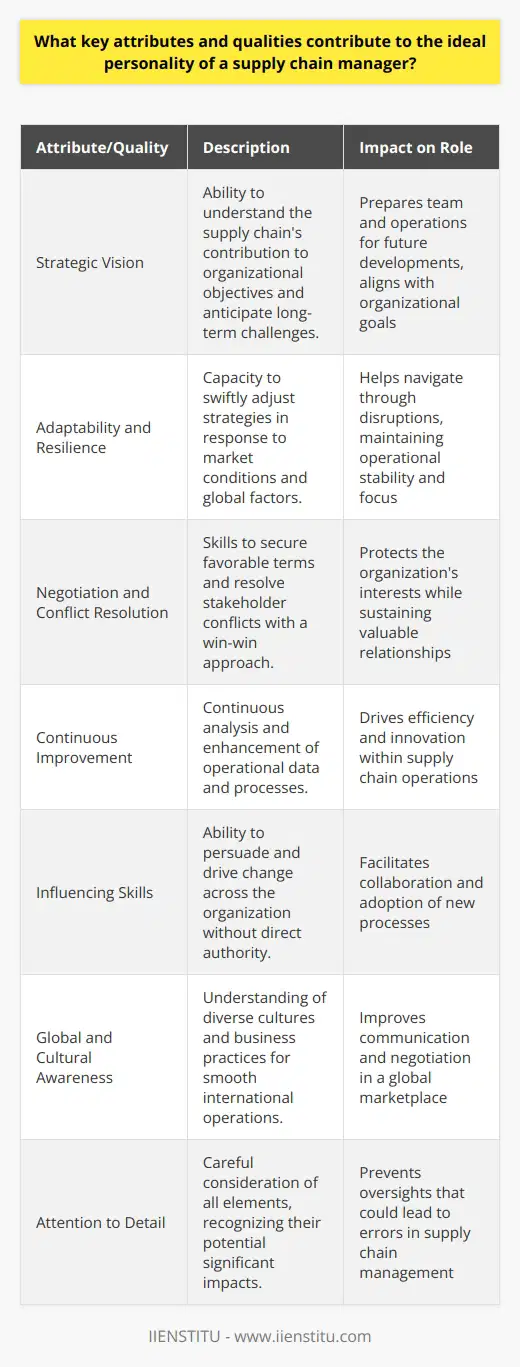
How can understanding workplace personality tests, such as the 4 Color Personality Test, enhance collaboration and communication between supply chain management teams?
Understanding Workplace Personality Tests
To enhance collaboration and communication within supply chain management teams, understanding workplace personality tests, like the 4 Color Personality Test, is crucial. These tests categorize personalities based on colors: red (dominant), blue (analytical), green (supportive), and yellow (innovative). By identifying team members' color-coded personalities, the team can harness individual strengths for improved efficiency and effectiveness.
Optimizing Team Dynamics
Recognizing each team member's diverse personality traits is essential for managers seeking to optimize team performance. Knowledge of these traits helps create a balanced team by allocating tasks according to individual strengths. In doing so, managers can prevent conflicts, boost cooperation, and enhance communication within the team, ultimately driving improved performance in supply chain management processes.
Fostering Collaboration
Understanding personalities using color tests contributes to fostering a collaborative environment where differences are celebrated rather than treated as barriers. Teams that understand and appreciate diverse personalities can work more efficiently, paving the way for smoother communication and collaboration. As a result, an inclusive environment promotes trust and accountability, empowering team members to contribute effectively to supply chain management operations.
Mitigating Conflict and Miscommunication
Disagreements within the workplace can often arise from misunderstandings attributed to different communication styles. Understanding varying personality traits through color tests enables managers to identify and address potential issues, preventing conflicts before they arise. Consequently, this awareness fosters an atmosphere of open communication and mutual understanding, ultimately leading to a more harmonious and efficient supply chain management team.
Promoting Personal Development
Finally, an understanding of workplace personality tests encourages personal development, as it provides employees with insight into their strengths and weaknesses. This self-awareness promotes personal and professional growth, empowering members to develop their skills efficiently and contribute effectively to supply chain management goals. By investing in personal development, organizations ensure their teams can strategically adapt to ever-evolving industry demands.
In conclusion, understanding workplace personality tests like the 4 Color Personality Test, is vital in enhancing collaboration and communication within supply chain management teams. By recognizing individual strengths, optimizing team dynamics, fostering collaboration, mitigating conflict, and promoting personal development, organizations can build resilient and adaptive teams capable of navigating a dynamic and complex supply chain landscape effectively.
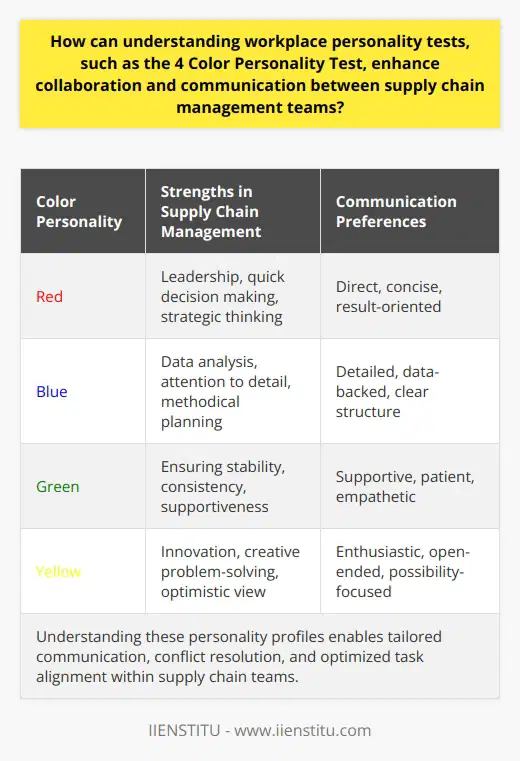
Do certain personality types generally excel more in a supply chain management role, and if so, which types are they?
Personality Types in Supply Chain Management
Analyzing the Role of Personality
It is worth examining whether certain personality types perform better in supply chain management positions. To answer this question, we first need to define supply chain management and understand the traits required for success. Supply chain management involves overseeing the process of bringing products from their point of origin to consumers. Key activities include planning, sourcing, production, transportation, and customer service. To excel in this role, individuals must possess strong analytical, problem-solving, leadership, communication, and negotiation skills.
Extraversion and Performance
Extraversion is a personality trait often associated with leadership and performance in supply chain management. Extraverts tend to enjoy social situations, take charge, and have strong communication skills. These skills are essential when negotiating with suppliers, resolving conflicts, and working with cross-functional teams. Moreover, extraverts are commonly adaptable, an important trait for navigating the changes common in supply chain environments.
Conscientiousness and Attention to Detail
Another important trait in supply chain management is conscientiousness. Highly conscientious individuals are organized, responsible, and possess a strong work ethic. They are often detail-oriented, a crucial quality for managing complex logistics processes and adhering to strict regulatory requirements. A supply chain manager with high conscientiousness is likely to consistently meet deadlines, reduce errors, and manage risks effectively.
Agreeableness and Collaboration
Agreeableness, characterized by a cooperative and harmonious disposition, can also positively impact supply chain management performance. Agreeable individuals tend to work well in teams and are more likely to be flexible in negotiations. Their ability to form close relationships with suppliers and colleagues fosters collaboration and improves supply chain performance.
Balancing Different Traits
While certain traits are beneficial in supply chain management, it is essential to understand that no single personality type guarantees success. A well-rounded supply chain manager needs to balance multiple traits – extraversion for negotiation and leadership, conscientiousness for attention to detail, and agreeableness for effective collaboration. Ultimately, it is essential to recognize that different situations and contexts might require diverse personality traits and skill sets.
In conclusion, while certain personality traits like extraversion, conscientiousness, and agreeableness can boost performance in supply chain management roles, it is vital to consider multiple factors, including work experience, skills, and organizational context. Therefore, organizations should focus on a holistic approach to talent management rather than relying solely on personality types to predict success in supply chain management.
